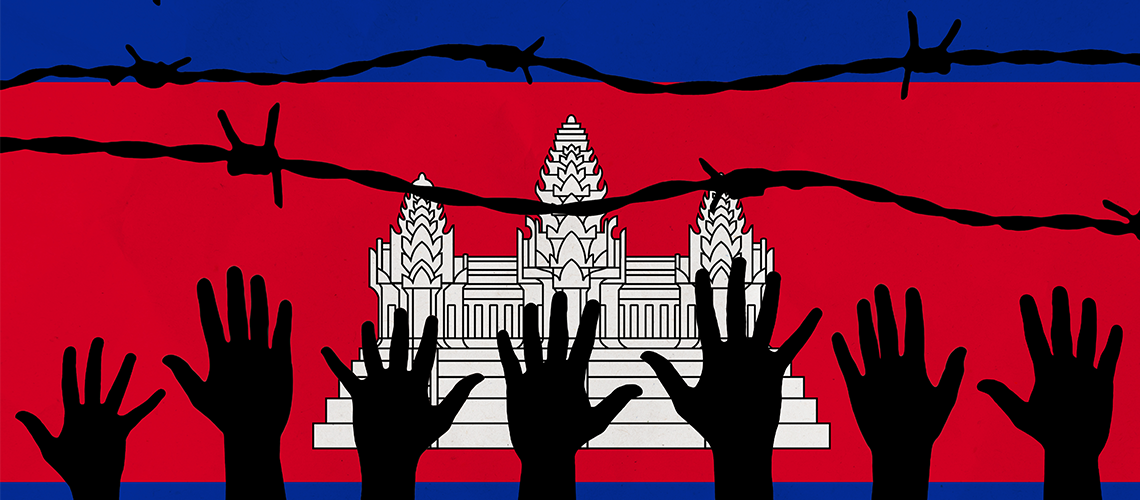‘Sham’ election is latest attack on Cambodian democracy
Rebecca Root, IBA Southeast Asia CorrespondentTuesday 29 August 2023

The most recent threat to democratic rule in Cambodia came in the form of July’s national election, which was held against the background of an ongoing media crackdown.
Going into the election, the 71-year-old Prime Minister, Hun Sen, had ruled the Southeast Asian nation as head of the Cambodian People's Party (CPP) for almost 40 years. In late July, the CPP announced it had won the election by a landslide. This came as no surprise given that the main opposition, the Candlelight Party, had been disqualified from running in May.
‘All real opposition was prevented from competing in the election […] thus, Cambodia can hardly be said to have a democracy’, says Paul Chambers, a lecturer and Special Advisor on International Affairs at Naresuan University in Thailand. According to Felix Ng, Asia Pacific Regional Forum Liaison Officer of the IBA Business Crime Committee and a partner at Haldanes in Hong Kong, the result raised concerns as to whether the election ‘was free and fair’.
The Cambodian government did not respond to Global Insight’s request for comment.
The governing regime – which has been labelled ‘abusive and authoritarian’ by Human Rights Watch – has become synonymous with the suppression of opposition and critics. Prior to the election, it closed down one of the country’s last remaining independent media outlets, Voice of Democracy, and blocked the websites of several other media outlets.
Cambodia has no reason to ensure more fair elections, and they are not nearly as dependent on democratic donors as they were in the past
Joshua Kurlantzick
Senior Fellow for Southeast Asia, Council on Foreign Relations
‘This tight control over information dissemination aims to suppress any criticism of the government and restrict access to dissenting voices for the Cambodian population, raising concerns about the fairness and transparency of the electoral process’, said the ASEAN Regional Coalition to #StopDigitalDictatorship in a joint statement. ‘We denounce the government’s systematic disregard for its international human rights commitments, particularly its failure to uphold people's right to access information and safeguard press freedom in the nation. These rights are not only enshrined in the Cambodian Constitution but also protected by the 1995 Law on the Media.’
In early March, opposition leader Kem Sokha was placed under house arrest for 27 years after being convicted on charges of treason. Experts reporting to the UN Human Rights Office of the High Commissioner called the conviction an example of ‘an ongoing pattern of the misapplication of laws to target political opponents and any critic of the government’.
Prior to the 2018 election, similar incidents took place. The main opposition at the time, the Cambodia National Rescue Party, which almost gained power in 2013, was dissolved while The Cambodia Daily newspaper was shut down and the Phnom Penh Post sold off. In 2018, the Cambodian parliament also adopted a lèse-majesté law, which introduced to the country’s criminal code offences against the dignity of the reigning sovereign. ‘[The law] might have the effect of stifling those who wish to express legitimate criticisms of the royal government, while the country already had a broad criminal defamation law on the books’, explains Ng.
Responding to the election result in July, the US government paused certain programmes sending foreign assistance to Cambodia and imposed visa bans on certain Cambodian individuals. The UK government also released a statement describing the election as ‘neither free nor fair’ and ‘a missed opportunity to strengthen Cambodia’s democracy’.
Joshua Kurlantzick, Senior Fellow for Southeast Asia at the Council on Foreign Relations, based in Washington, DC, calls the latest election ‘a complete sham’. He believes there’s very little the international community can do ‘since Cambodia has no reason to ensure more fair elections, and they are not nearly as dependent on democratic donors as they were in the past’. Kurlantzick highlights that the country is more dependent on China now – indeed, according to ThinkChina, 48 per cent of the foreign aid Cambodia received in 2019 came from China.
To Kurlantzick, the election was ‘just a vehicle to pass on power’, which conveyed nothing of the will of voters. Chambers believes the election was merely a move to legitimise Hun Sen’s continuing ‘dictatorship’. In the days following the election, Hun Sen named his 45-year-old son, Hun Manet, as his successor. King Norodom Sihamoni then issued the formality of a royal decree, stating the intention of succession, and in late August, Cambodia’s parliament confirmed Hun Manet as the next premier. Hun Sen will remain at the helm of the CPP.
The change in leadership is merely ‘semantic’, says Chambers. ‘Hun Sen remains the power in the background. Hun Sen is also still President of the Senate, the privy council, and the CPP.’ These are roles Hun Sen will continue to hold ‘at least until 2033’, according to a post he made on the messaging app Telegram. The change in premier ‘marks Hun Sen attempting to make a transition in dynastic leadership but he keeps the reins of power’, adds Chambers.
Hun Manet holds a PhD in economics and was educated in both the UK and the US. He co-founded a non-governmental organisation, the Samdech Techo Voluntary Youth Doctor Association. Having held military and high-profile roles, he has long been groomed to take up his father’s role. Some have suggested that Hun Manet could usher in a more modern era for the country. ‘It remains to be seen whether the transition to a potentially more liberal leader will herald a new start in Cambodia’, says Ng.
Chambers suggests that Hun Manet may tilt Cambodia closer to the US. However, for Kurlantzick, Hun Sen’s continued power likely means the situation will remain much the same – that is, ‘a continuation of highly autocratic politics’.
Image credit: elif/AdobeStock.com
